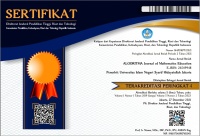MENINGKATKAN KEMAMPUAN BERPIKIR ALJABAR SISWA DENGAN PENDEKATAN REALISTIC MATHEMATICS EDUCATION (RME)
Abstract
Abstract
Algebraic thinking ability is the ability needed to analyze, generalize, model, prove, predict, and solve problems using symbols, patterns, and numbers presented in the form of words, diagrams, tables, graphs, and equations. Students' algebraic thinking skills still need to improve. This study aimed to test and determine the effect of the RME approach on students' algebraic thinking skills. This research is a type of quasi-experimental research with a research design using a Randomized Posttest Only Control Group Design. The research subjects were X IPA group students, as many as 60 people. The sample determination was carried out using the Cluster Random Sampling technique. Data collection techniques using student algebraic thinking ability tests in the form of descriptions totaling 8 items, documentation studies, and interviews. The results showed an effect of the RME approach on students' algebraic thinking skills, and the effect was classified as moderate. Therefore, RME can be an alternative learning model that can be used to improve students' algebraic thinking skills.
Abstrak
Kemampuan berpikir aljabar adalah kemampuan yang dibutuhkan untuk menganalisis, menggeneralisasi, memodelkan, membuktikan, memprediksi, dan memecahkan masalah, dengan menggunakan simbol, pola dan bilangan yang disajikan dalam bentuk kata, diagram, tabel, grafik, dan persamaan. Kemampuan berpikir aljabar siswa masih rendah. Tujuan dari penelitian iniadalah menguji dan mengetahui besarnya pengaruh pendekatan RME terhadap kemampuan berpikir aljabar siswa. Penelitian ini merupakan jenis penelitian kuasi eksperimen dengan rancangan penelitian menggunakan Randomized Posttest Only Control Group Design. Subjek penelitian adalah siswa kelompok X IPA sebanyak 60 orang. Penentuan sampel dilakukan dengan teknik Cluster Random Sampling. Teknik pengumpulan data menggunakan tes kemampuan berpikir aljabar siswa berbentuk uraian berjumlah 8butir soal, studi dokumentasi, dan wawancara. Analisis data menggunakan uji t. Hasil penelitian menunjukkan bahwa terdapatpengaruh pendekatan RME terhadap kemampuan berpikir aljabar siswa dan pengaruhnya tergolong kategori sedang. Oleh karena itu RME dapat menjadi alternatif model pembelajaran yang dapat digunakan untuk meningkatkan kemampuan berpikir aljabar siswa.
Keywords
References
Agusta, E. S. (2020). Peningkatan Kemampuan Matematis Siswa Melalui Pendekatan Pendidikan Matematika Realistik. ALGORITMA: Journal of Mathematics Education, 2(2), 145–165. https://doi.org/10.15408/ajme.v2i2.17819
Al-Tabany, T. I. B. (2014). Mendesain Model Pembelajaran Inovatif, Progresif, dan Kontekstual: Konsep, Landasan, dan Implementasinya pada Kurikulum 2013 (Kurikulum Tematik Integratif). Prenada Media Group.
Ayala Altamirano, C., & Marta Molina. (2020). Meanings Attributed to Letters in Functional Contexts by Primary School Students. IJSME: International Journal of Science and Mathematics Education, 18, 1271–1291. https://doi.org/https://doi.org/10.1007/s10763-019-10012-5
Cockcroft, W. . (1982). Mathematics Counts. Report of the Committee of Inquiry into the Teaching of Mathematics in Schools in England and Wales. In Report of the Committee of Inquiry into the Teaching of Mathematics in Schools in England and Wales (pp. ix–311).
Delina, Afrilianto, M., & Rohaeti, E. E. (2018). Confidence Siswa Smp Melalui Pendekatan. Jurnal Pembelajaran Matematika Inofatif, 1(3), 281–288. https://doi.org/10.22460/jpmi.v1i3.281-288
Dhayanti, D., Johar, R., & Zubainur, C. M. (2018). Improving Students’ Critical and Creative Thinking through Realistic Mathematics Education using Geometer’s Sketchpad. JRAMathEdu, 3(1), 25–35.
Dominowski, R. L. (2022). Teaching Undergraduates. Taylor & Francis.
Farida, F., Hartatiana, H., & Joemsittiprasert, W. (2019). The Use of Realistic Mathematics Education (RME) in Improving Mathematical Analogical Ability and Habits of Mind. Al-Jabar : Jurnal Pendidikan Matematika, 10(2), 175–186. https://doi.org/10.24042/ajpm.v10i2.3540
Farida, Hartatiana, & Joemsittiprasert, W. (2019). The Use of Realistic Mathematics Education (RME) in Improving Mathematical Analogical Ability and Habits of Mind. Al-Jabar: Jurnal Pendidikan Matematika, 10(2), 177–186.
Farida, I., & Hakim, D. L. (2021). Kemampuan Berpikir Aljabar Siswa SMP Pada Materi Sistem Persamaan Linear Dua Variabel (SPLDV). JPMI, 4(5), 1123–1136. https://doi.org/10.22460/jpmi.v4i5.1123-1136
Hadi, W., & Faradillah, A. (2019). The Algebraic Thinking Process in Solving HOTS Questions Reviewed from Student Achievement Motivation. Al-Jabar: Jurnal Pendidikan Matematika, 10(2), 327–337.
Hastjarjo, T. D. (2019). Rancangan Eksperimen-Kuasi. Buletin Psikologi, 27(2), 187. https://doi.org/10.22146/buletinpsikologi.38619
Hayatun Nisa, N., & Nursuprianah, I. (2013). Pengaruh Pemahaman Konsep Aritmatika Terhadap Kemampuan Berpikir Aljabar Siswa (Studi Kasus pada Siswa Kelas VII SMP Negeri 1 Ketanggungan Kabupaten Brebes ). Eduma : Mathematics Education Learning and Teaching, 2(2). https://doi.org/10.24235/eduma.v2i2.39
Herbert, K., & Brown, R. H. (1997). Patterns as Tools for Algebraic Reasoning. Teaching Children Mathematics, 3(6), 340–345.
Heuvel-panhuizen, M. Van Den, & Drijvers, P. (2014). Realistic Mathematic Education. Encyclopedia of Mathematics Education. https://doi.org/10.1007/978-94-007-4978-8
Hidayat, W., Jayanti, K., Nurismadanti, I. F., Zulfikar, M., Akbar, I., Pertiwi, K. A., & Rengganis, P. (2018). Pembelajaran RME (Realistic Matematics Education) Terhadap Kemampuan Berpikir Kreatif Matematik Pada Siswa SMP. JPMI, 2(1), 41–50.
Johar, R., Khairunnisak, C., & Rohaizati, U. (2022). Students’ Mathematical Representation Ability in Learning Algebraic Expression using Realistic Mathematics Education. JDM, 9(1), 151–169. https://doi.org/10.24815/jdm.v9i1.25434
Kemendikbud. (2014). Implementasi Kurikulum 2013. Badan Pengembangan Sumber Daya Manusia Pendidikan dan Kebudayaan dan Penjaminan Mutu Pendidikan.
Kieran, C. (2004). Algebraic Thinking in the Early Grades : What Is It? Mathematics Educator, 8(1), 139–151.
Kusumaningsih, W., Darhim, Herman, T., & Turmudi. (2018). Improvement Algebraic Thinking Ability Using Multiple Representation Strategy on Realistic Mathematics Education. IndoMS. J.M.E, 9(2), 281–290. https://doi.org/10.22342/jme.9.2.5404.281-290
Kusumaningsih, W., Mustoha, A., & Rahman, F. (2018). Pengaruh Strategi Multiple Representasi Pada Pembelajaran Realistik Matematik Terhadap Kemampuan Berpikir Aljabar Siswa. JIPMat, 3(1), 75–80. https://doi.org/10.26877/jipmat.v3i1.2420
Laurens, T., Batlolona, F. A., Batlolona, J. R., & Leasa, M. (2018). How Does Realistic Mathematics Education (RME) Improve Students’ Mathematics Cognitive Achievement? Eurasia Journal of Mathematics, Science and Technology Education, 14(2), 569–578. https://doi.org/10.12973/ejmste/76959
Leasa, M., & Corebima, A. D. (2017). The Effect of Numbered Heads Together (NHT) Cooperative Learning Model on the Cognitive Achievement of Students with Different Academic Ability. Journal of Physics: Conference Series, 795(1). https://doi.org/10.1088/1742-6596/755/1/011001
Levin, M., & Walkoe, J. (2022). Seeds Of Algebraic Thinking: A Knowledge In Pieces Perspective On The Development Of Algebraic Thinking. ZDM. https://doi.org/10.1007/s11858-022-01374-2
Marinda, L. (2020). Teori Perkembangan Kognitif Jean Piaget Dan Problematikanya Pada Anak Usia Sekolah Dasar. An-Nisa’: Jurnal Kajian Perempuan & Keislaman, 13(1), 116–152.
Mashuri, S., Jahring, & Nasruddin. (2020). Student Teams Achievement Divisions (STAD) dengan Pendekatan Realistic Mathematics Education (RME) Terhadap Kemampuan Pemahaman Matematis. AKSIOMA: Jurnal Program Studi Pendidikan Matematika, 9(4), 909–916. https://doi.org/https://doi.org/10.24127/ajpm.v9i4.2979
Mayasari, D., & Habeahan, N. L. S. (2021). MENYELESAIKAN SOAL CERITA MATEMATIKA. Aksioma: Jurnal Program Studi Pendidikan Matematika, 10(1), 252–261.
National Council of Teachers of Mathematics (NCTM). (2000a). Principles and Standards for School Mathematics. Reston: The National Council of Teachers of Mathematics, Inc.
National Council of Teachers of Mathematics (NCTM). (2000b). Principles and Standars for School Mathematics. NCTM.
Niels, H., Uffe, J., Jankvist, T., & Hoff, T. (2022). Three Past Mathematicians’ Views On History In Mathematics Teaching And Learning: Poincaré, Klein, And Freudenthal. ZDM. https://doi.org/10.1007/s11858-022-01376-0
Noor, J. (2019). Metodologi Penelitian: Skripsi, Tesis, Disertasi, dan Karya Ilmiah. Kencana.
Nurjanah, D., Nurjanah, E., Hasan, A. F., Nabila, A., & ... (2021). Kontribusi sejarah aljabar Babilonia dan aljabar Arab terhadap berpikir aljabar. Jurnal …, 7(2), 112–123. http://journal.uinsgd.ac.id/index.php/analisa/article/view/8231%0Ahttp://journal.uinsgd.ac.id/index.php/analisa/article/download/8231/6531
Palinussa, A. L., Molle, J. S., Gaspersz, M., & Palinussa, A. L. (2021). Realistic Mathematics Education: Mathematical Reasoning and Communication Skills in Rural Contexts. IJERE, 10(2), 522–534. https://doi.org/10.11591/ijere.v10i2.20640
Patton, B. (2012). Analyzing Algebraic Thinking Using “Guess My Number” Problems. International Journal of Instruction, 5(1), 5–22.
Permatasari, D. (2021). Analisis Kesulitan Siswa dalam Kegiatan Transformasional Berpikir Aljabar. Jurnal Gantang, 6(1), 19–27. https://doi.org/10.31629/jg.v6i1.2523
Rudyanto, H. E., Wangid, M. N., & Gembong, S. (2019). The Use of Bring Your Own Device-based Learning to Measure Student Algebraic Thinking Ability. IJET, 14(23), 233–241.
Rustam, A., & Susanti, G. (2018). The Effectiveness Of Learning Models Realistic Mathematics Education And Problem Based Learning Toward Mathematical Reasoning Skills At Students Of Junior High School. JME, 3(1), 33–39.
Sembiring, R. K. (2010). Pendidikan Matematika Realistik Indonesia (PMRI): Perkembangan dan Tantanganya. IndoMS. J.M.E, 1(1), 11–16.
Setyaningsih, R., Haryanto, & Rhosyida, N. (2021). Pengaruh Pendekatan Realistic Mathematics Education Terhadap Keterampilan Berpikir Kritis Mahasiswa. AKSIOMA: Jurnal Program Studi Pendidikan Matematika, 10(3), 1658–1669. https://doi.org/https://doi.org/10.24127/ajpm.v10i3.3859
Sibgatullin, I. R., Korzhuev, A. V., Khairullina, E. R., Sadykova, A. R., Baturina, R. V., & Chauzova, V. (2022). A Systematic Review on Algebraic Thinking in Education. Eurasia Journal of Mathematics, Science and Technology Education, 18(1), 1–15. https://doi.org/10.29333/EJMSTE/11486
Sukri, Y. F., & Widjajanti, D. B. (2015). Pengaruh Pendekatan Rme Terhadap Motivasi Dan Prestasi Belajar Siswa Sd Melalui Pembelajaran Tematik-Integratif. Jurnal Prima Edukasia, 3(2), 227–238. https://doi.org/10.21831/jpe.v3i2.6503
Veloso, M. G., Landanganon, L., Lamanilao, R., & Elipane, L. (2021). Integration Of Ignatian Values In The Development Of Algebraic Thinking Via Utilization Of Quasi-Variables: A Lesson Study. IJERE, 10(4), 1298–1305. https://doi.org/10.11591/ijere.v10i4.21583
Vennebush, G. P., Marquez, E., & Larsen, J. (2005). Embedding Algebraic Thinking Throughout The Mathematics Curriculum. Mathematics Teaching in The Middle School, 11(2), 86–93.
Wati, E. ., & Murtiyasa, B. (2016). No Title. Kesalahan Siswa Smp Dalam Menyelesaikan Soal Matematika Berbasis Pisa Pada Konten Change And Relationship, 199–209.
Wiley, J. (2003). Dr. Math Mempersiapkanmu Belajar Aljabar, Terjemahan dari Dr. Math Gets You Ready for Algebra oleh Ervina Yudha Kusuma (Cet. I). Bandung: PT Intan Sejati.
Yuniati, S. (2012). Menentukan Kelipatan Persekutuan Terkecil (KPK) dan Faktor Persekutuan Terbesar (FPB) dengan Menggunakan Metode “PEBI.” Beta, 5(2), 149–165.
DOI: 10.15408/ajme.v5i1.32581
Refbacks
- There are currently no refbacks.












